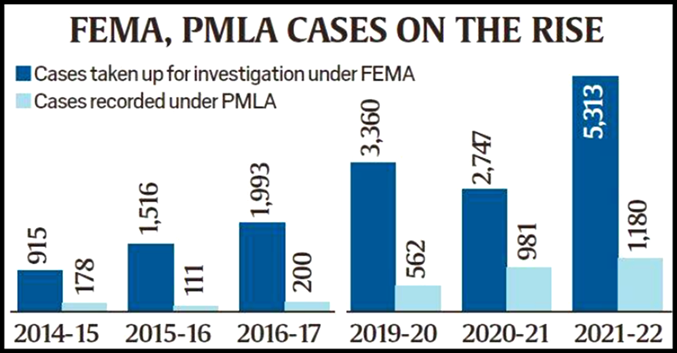Description

Copyright infringement not intended
In News
- An increasing number of cases registered by the Enforcement Directorate (ED) under the Foreign Exchange Management Act, 1999 (FEMA) and the Prevention of Money Laundering Act, 2002 (PMLA).
- According to data shared by the Union Minister of State for Finance in the Lok Sabha, the ED registered 14,143 cases under FEMA and PMLA between 2019-20 and 2021-22, as compared to 4,913 cases from 2014-15 to 2016-17 — an increase of over 187%.

Foreign Exchange Management Act (FEMA)
- The Foreign Exchange Management Act, 1999 (FEMA) was enacted by the Indian parliament to consolidate and amend the law relating to foreign exchange.
- The objective was:
- To facilitate external trade and payments.
- Development and maintenance of the foreign exchange market in India.
- It replaced the Foreign Exchange Regulation Act (FERA).
- Under the Foreign Exchange Regulation Act (FERA) of 1973, everything was prohibited unless specifically permitted.
- It required imprisonment even for minor offences.
- Under FERA, a person was presumed guilty unless he proved himself innocent.
- Under FEMA, the general principle is that all current account transactions are permitted unless expressly prohibited and all Capital account transactions are prohibited unless expressly permitted.
- It also paved the way for the introduction of the Prevention of Money Laundering Act, 2002, which came into effect on 1 July 2005.
Prevention of Money Laundering Act, 2002
- Prevention of Money Laundering Act, 2002 was passed by the Indian parliament to prevent money laundering and to provide for confiscation of property derived from money laundering.
- PMLA came into effect on July 1, 2005.
- The Act prescribes that any person found guilty of money laundering shall be jailed from 3 years to 7 years; the maximum punishment may extend to 10 years instead of 7 years.
- The Director or officer above the rank of Deputy Director with the authority of the Director can attach property believed to be "proceeds of crime" for 180 days.
- The Adjudicating Authority is the authority appointed by the central government to exercise jurisdiction, powers and authority conferred under PMLA.
- The Adjudicating Authority shall not be bound by the procedure laid down by the Code of Civil Procedure,1908, but shall be guided by the principles of natural justice and subject to the other provisions of PMLA.
- A person, who is accused of having committed the offence of money laundering, has to prove that alleged proceeds of crime are lawful property.
- An Appellate Tribunal is the body appointed by Union Government.
- It has the power to hear appeals against the orders of the Adjudicating Authority and any other authority under the Act.
https://indianexpress.com/article/india/govt-data-fema-pmla-cases-triple-first-3-years-nda-govt-8051284/
1.png)
https://t.me/+hJqMV1O0se03Njk9















